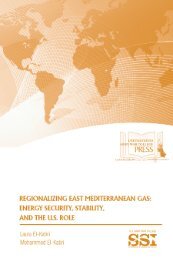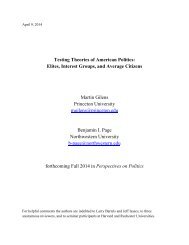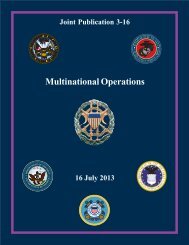ABUSE OF STRUCTURED FINANCIAL PRODUCTS- Misusing Basket Options to Avoid Taxes and Leverage Limits MAJORITY AND MINORITY STAFF REPORT
ABUSE OF STRUCTURED FINANCIAL PRODUCTS- Misusing Basket Options to Avoid Taxes and Leverage Limits MAJORITY AND MINORITY STAFF REPORT
ABUSE OF STRUCTURED FINANCIAL PRODUCTS- Misusing Basket Options to Avoid Taxes and Leverage Limits MAJORITY AND MINORITY STAFF REPORT
You also want an ePaper? Increase the reach of your titles
YUMPU automatically turns print PDFs into web optimized ePapers that Google loves.
82<br />
financing, RenTec’s basket option securities portfolio reached an outst<strong>and</strong>ing notional value of<br />
more than $50 billion. 433<br />
The banks <strong>and</strong> hedge funds claimed the option accounts could operate entirely outside of<br />
the federal margin rules, even though those accounts operated in the same way as prime<br />
brokerage accounts subject <strong>to</strong> margin rules. Circumventing margin rules by relabeling a prime<br />
brokerage account as an “option” account is not, however, a legitimate business purpose.<br />
Moreover, bypassing the leverage limits did not displace tax avoidance as a key motivating<br />
fac<strong>to</strong>r for the basket option activity, as detailed above. Using the basket option structure as a<br />
way <strong>to</strong> circumvent federal leverage limits is another example of how the attempt <strong>to</strong> classify this<br />
transaction as a derivative was used <strong>to</strong> skirt laws <strong>and</strong> regulations in addition <strong>to</strong> tax.<br />
(4) Restructuring the <strong>Basket</strong> Option Products<br />
The final part of the basket options s<strong>to</strong>ry involves the response of the banks <strong>and</strong> hedge<br />
funds <strong>to</strong> IRS efforts <strong>to</strong> s<strong>to</strong>p the basket options from being misused <strong>to</strong> avoid federal taxes.<br />
Deutsche Bank has offered basket options <strong>to</strong> a shrinking number of clients since around<br />
1998; Barclays has offered them <strong>to</strong> a single large client, RenTec, since 2002. From 1998 <strong>to</strong><br />
2013, Deutsche Bank issued a <strong>to</strong>tal of 156 MAPS options <strong>to</strong> 13 hedge funds, including 36 <strong>to</strong><br />
RenTec <strong>and</strong> 10 <strong>to</strong> George Weiss. 434 Barclays issued a <strong>to</strong>tal of 43 COLT options, all <strong>to</strong> RenTec.<br />
The hedge funds used those basket options <strong>to</strong> conduct more than $100 billion in securities<br />
transactions, presumably claiming that virtually all of the trading profits from options that lasted<br />
more than one year could be treated as long-term capital gains subject <strong>to</strong> the lower tax rate.<br />
In November 2010, the IRS issued the Generic Legal Advice Memor<strong>and</strong>um (GLAM)<br />
advising that basket options cannot be used <strong>to</strong> turn short-term trading profits in<strong>to</strong> long-term<br />
capital gains. Both Deutsche Bank <strong>and</strong> Barclays acknowledged <strong>to</strong> the Subcommittee that the<br />
banks were aware of the GLAM when it was issued, <strong>and</strong> that the IRS had determined that the<br />
basket option structure did not function as an option <strong>and</strong> should not be respected as such for tax<br />
purposes. Despite knowing of the GLAM, Barclays personnel continued issuing the same types<br />
of basket options <strong>to</strong> RenTec for another two years. Deutsche Bank responded <strong>to</strong> the GLAM by<br />
suspending its issuance of new basket options, while continuing <strong>to</strong> administer multiple basket<br />
options already in existence. In 2012 for Deutsche Bank <strong>and</strong> 2013 for Barclays, the banks issued<br />
revised basket option products, with terms lasting less than one year, so that the structures could<br />
no longer be used <strong>to</strong> characterize short-term trading profits as long-term capital gains.<br />
For years, Deutsche Bank <strong>and</strong> Barclays spent a great deal of time, energy, <strong>and</strong> money <strong>to</strong><br />
secure legal advice <strong>and</strong> opinions reaffirming the basket options as derivatives, in order <strong>to</strong><br />
maintain the benefits that such a characterization provided. While the banks have not changed<br />
their position that the basket options are derivatives – a position which benefits the banks as well<br />
433 See 6/25/2008 email exchange between Eamon McCooey <strong>and</strong> Michael Ginelli of Deutsche Bank, “Tentative:<br />
MAPS Working Group – Wednesday Sessions @ 3PM – June Meetings,” DB-PSI 00025040-41. See also<br />
6/25/2008 email from Michael Ginelli <strong>to</strong> Eamon McCooey of Deutsche Bank, “Re: Tentative: MAPS Working<br />
Group-Wednesday Sessions @3 PM-JuneMeetings,” DB-PSI 0025040-041; 6/24/2009 memor<strong>and</strong>um, “Palomino<br />
Limited (“Palomino”),” prepared by Barclays, BARCLAYS-PSI-139757-766, at 764.<br />
434 See undated <strong>and</strong> untitled Deutsche Bank table prepared for Subcommittee, DB-PSI 00052577.







